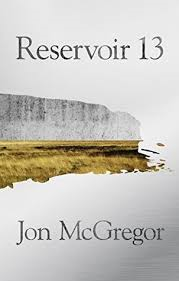I have come up gasping for air after finishing Jon McGregor’s remarkable novel Reservoir 13 (HarperCollins 4th Estate 2017). This book is literary magic, a slow burn of a story with the tragedy of a missing teenager haunting all of the characters of this small English town over the passing years. The structure of the book is quite extraordinary: the first chapter describes the people gathered together before dawn, awaiting instructions about their involvement in the search party for the missing girl, Rebecca Shaw. This morphs into a detailed account of the goings-on in the village, and in individual lives, that continues in long, unbroken paragraphs. A sentence here about what flowers are blooming, a sentence there about the state of the vegetable allotments. A line about the fog or the rain or the nesting swallows or the mating foxes or the fighting badgers, then a seemingly unconnected line about water levels, supposed sightings of the missing girl, the lambing, the antics of Mischief Night or the harvest festival. McGregor’s nature writing is superb – he captures the wild environment and the farmed landscape in minute and glorious detail. Each chapter begins with the fireworks of New Year’s Eve, and so begins another year. And through all of this are the people – young romances explored, marriages made and broken, people aging and becoming ill and recovering (or not), neighbours building bridges or disagreeing over minor conflicts, children born and schooled, adolescents finishing school and making their way in the world. The entire village becomes as familiar as extended family. Over 13 years, time passes and everyone ages and animals come and go and situations change and throughout it all, the search for the missing girl goes on, at first in earnest and then intermittently, until she is only a memory. And every so often the refrain: Her name was Rebecca, or Becky, or Bex. Reminding us of her presence, and of her absence. I have never read a work structured in this unusual way. It draws you in and holds you close; the rhythms of the natural world ebb and flow, creating an underlying thrum of life, overlaid by the melody of everyday happenings, and punctuated by the occasional beat of unexpected violence or random kindness or surprising betrayal or unconditional loyalty or sexual desire. Do not expect a fast-paced plot or a clever twist or a narrative arc ending in a stunning conclusion. Do expect to be held as if you are in a rubber tyre, floating downstream in a slow-moving river, with the occasional small eddy or whirlpool, with the inexorable rush of the water pulling you ever onwards. Expect insightful perspective on the interiority of lives lived; expect a dry humour that explodes out of nowhere and causes you to laugh in recognition. I don’t quite understand how McGregor has achieved this quiet beauty, this subtle energy, this gentle fury, this understated magnificence. But if you are a literary writer, or love reading fine literary prose, get this book immediately. My only question is: why haven’t I read it before now?

